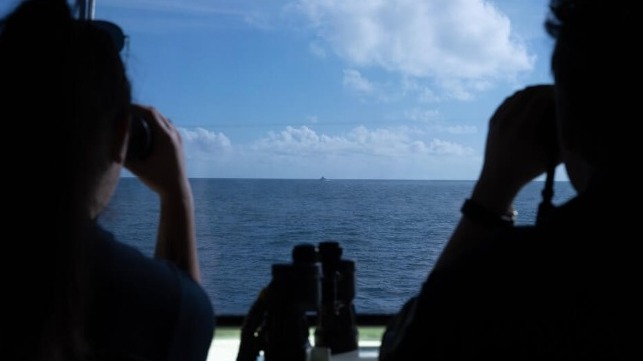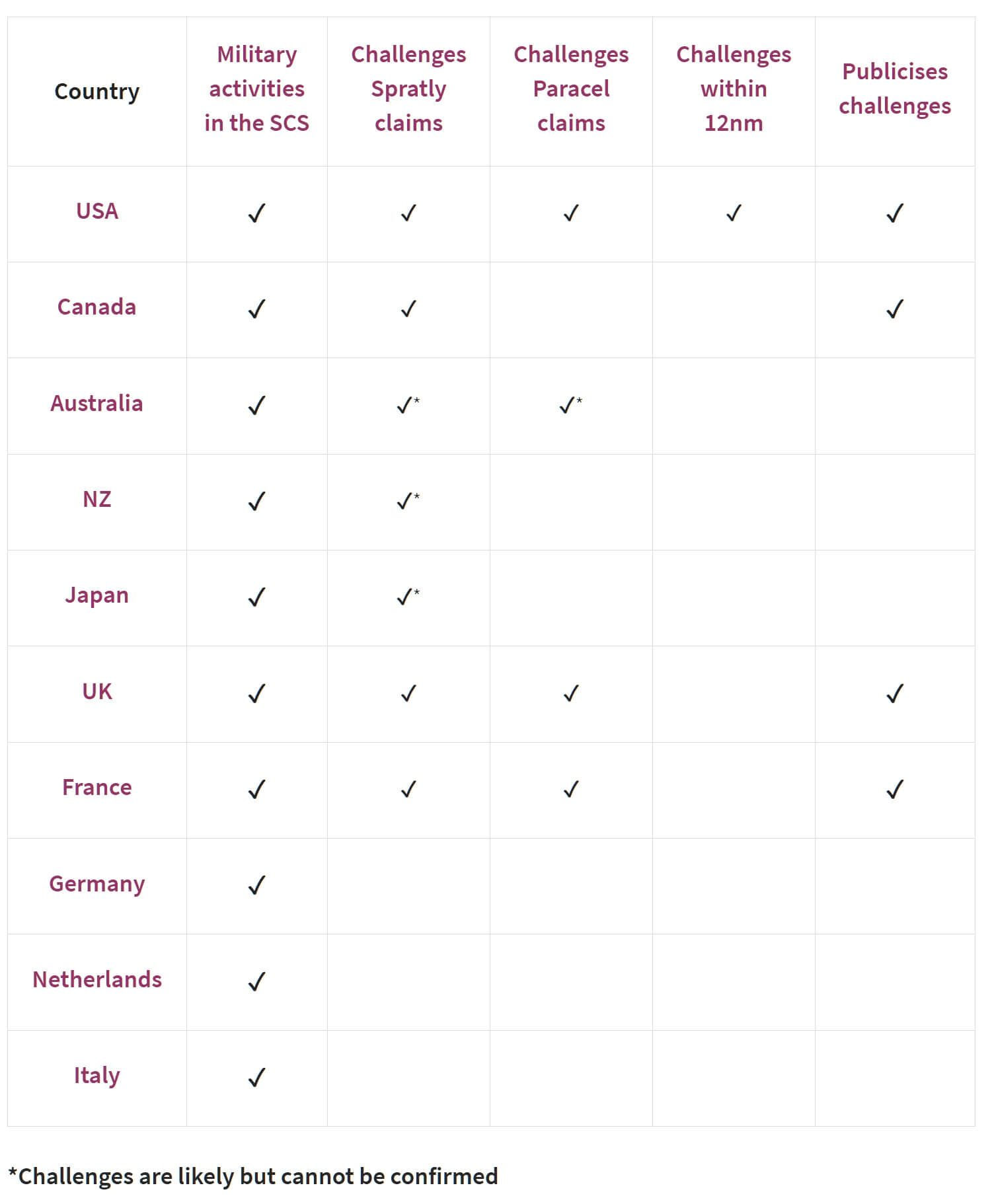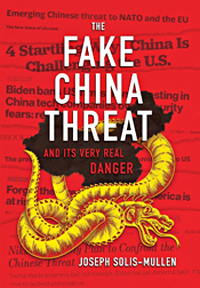WWIII
Military Challenges to China's South China Sea Claims are Increasing

[By Joe Keary]
Deployments of ships and aircraft to challenge China’s illegal claims in the South China Sea are increasing. European ships are appearing more often, while Asia-Pacific countries are increasingly conducting activities in areas that China regards as sensitive.
Several nations have claims in the South China Sea, but China’s claim is the most extensive and controversial. Beijing seeks to enforce sovereign rights and jurisdiction over all features within the nine-dash line, including the islands, rocks and atolls that make up the Paracel and Spratly Islands. China claims this territory despite a 2016 ruling that found that China’s claims had no basis in international law.
With international law doing little to curb China’s ambitions, more countries are using their militaries to challenge China’s claims. In 2024, more European navies operated in the South China Sea than previously in recent years, with Britain, France, Germany, Italy and the Netherlands all sending ships to the region. Meanwhile regional counties, such as Japan, Canada, New Zealand and Australia, stepped up their engagement, including via joint sailings with the Philippines in the South China Sea.
Different countries take different approaches to challenging China’s illegal claims in the South China Sea. Some militaries are operating within the nine-dash line. Others sail naval ships directly through the Spratly Islands. Some advertise their activities; others do not.
Only a few have conducted activities close to the Paracels, because doing so is unusually risky. A 2022 incident in which a Chinese pilot dumped chaff in front of an Australian P-8 Poseidon surveillance aircraft is an example of the risk.
The US is the only country to send aircraft or ships within 12 nautical miles of claimed features. By doing so, it would be entering territorial waters if China did in fact own the territory.
These military activities to challenge China’s claims have occurred since 2015:
 Apart from countries around the South China Sea, which must routinely operate on or over it, the US has by far the most public and active military presence. In 2023, the US military conducted 107 activities, including six specific operations to challenge China’s illegal claims under the US Freedom of Navigation program. US activities are always accompanied by strong public statements.
Apart from countries around the South China Sea, which must routinely operate on or over it, the US has by far the most public and active military presence. In 2023, the US military conducted 107 activities, including six specific operations to challenge China’s illegal claims under the US Freedom of Navigation program. US activities are always accompanied by strong public statements.
France and Canada are both active in the region, including within the Spratlys. Both advertise their military presence and actions. Canada now carries journalists on some South China Sea transits. It has operated close to the Paracel Islands, but, as demonstrated when a Chinese fighter fired flares near a Canadian helicopter in 2023, doing so comes with risks. In 2015, France boldly exercised its right to freedom of navigation by sailing a task force through the Paracels.
Australia has an active military presence in the South China Sea. There’s evidence that Australia operates close to China’s illegal claims. However, the tempo and nature of its military challenges are hard to determine, because Canberra does not advertise them. China’s military has been aggressive in seeking to deter Australia from operating near the two island groups by engaging in unsafe intercepts.
New Zealand has a semi-regular presence inside the nine-dash line, commensurate with the size of its armed forces. Meanwhile, Japan has a growing military presence in the region and is increasingly working with partners, such as the US, Australia and the Philippines. As with Australia, there are signs that Japan and New Zealand operate close to, or within, the Spratly group, but neither publicise specific actions, so the nature of them is hard to determine.
Britain sent a carrier strike group through the South China Sea in 2021 and intends to do so again next year. The British military operates close to the Spratly and Paracel Islands and uses public messaging to reinforce the importance of sailing in these areas.
Signalling growing European interest in the region, Germany, the Netherlands and Italy sent navy ships to the area in 2024. But none seems to have overtly challenged China’s claims within the Spratlys or Paracels.
The most notable regional absentee is South Korea. In 2018, a South Korean destroyer, Munmu the Great, took refuge from a typhoon in the Paracel Islands. But Seoul quickly clarified that the ship was not there to challenge China’s claims. Likewise, when the littoral states of South East Asia routinely operate there, they do not directly challenge China’s claims via freedom of navigation transits.
The growing presence of European navies in the South China Sea and stepped-up activity of Asia-Pacific countries there is welcome. It’s helping to push back on China’s growing aggression and reinforce longstanding rules and norms that underpin regional prosperity.
Joe Keary is a senior analyst at ASPI. This article appears courtesy of The Strategist and may be found in its original form here.
The opinions expressed herein are the author's and not necessarily those of The Maritime Executive.
China Tailors its History for South China Sea Propaganda

[By Mahbi Maulaya]
Historians in China need to play a dual role. Not only do they contribute to the advancement of knowledge, but they also need to actively defend their country’s national interests in the South China Sea. According to a report by the South China Morning Post, Chinese scholars gathered at the end of June were urged to “give a forceful response to false narratives” to strengthen their nation’s claims in the South China Sea.
At the seminar held in Hainan Province, China, Wu Shicun, founder of the National Institute for South China Sea Studies, emphasised the critical importance of “narrative construction and discourse building” for China. He said that the strategy would effectively defend the nation’s rights and interests in the South China Sea.
Many Chinese strategies have focused significant attention on the South China Sea conflict.
China asserts its claim to more than three million square kilometres of the Sea through the “nine-dash line” concept – contrary to international law. History has become a battleground in the dispute waters. Beijing has sought to draw upon the Western Han dynasty (200BCE to 9CE) to illustrate that China has historically fished in the waters for thousands of years. Yet a 2016 international tribunal decision on the United Nations Convention on the Law of the Sea did not concur, concluding that there was no legal basis for China’s historic rights claim.
At the June seminar, Wu Shicun encouraged the 100 historians and numerous legal experts in attendance to help China defend its “rights and interests” in the legal field of the South China Sea. The aim was to rebut the 2016 arbitration ruling invalidating China’s claims to most of the South China Sea, including contested areas in the Philippines’ Exclusive Economic Zone and areas claimed by Vietnam, Brunei, Malaysia, and the Philippines.
Wu was reported to have said that the international academic community had developed “some strange theories that deliberately distort the history of the South China Sea and maliciously smear China’s rights and claims”. He urged the audience to restore the “correct” historical and legal background.
As a consequence, it seems likely we will witness a form of history warfare as part of China’s new propaganda to boost its South China Sea claim, drawing on documents, maps, and records that purportedly portray China’s long-standing rights. It could also help China galvanise domestic support.
The gathering of Chinese historians in June, with the express intention of crafting narratives around China’s ownership of the South China Sea, should not be underestimated.
Many studies have indicated that governments have the ability to influence public opinion by directing citizens’ attitudes towards history. Political scientists Yiqing Xu and Jiannan Zhao found that the historical narrative of China’s humiliation in the past has contributed to its society’s scepticism towards foreign governments and support for China’s aggressive foreign policies. This illustrates the powerful effect of propaganda in Chinese society.
Propaganda based on China’s history may also be directed at individuals who are not Chinese citizens. It is reasonable to anticipate that China’s interpretation of the South China Sea history will be taught in mainland China’s universities, where international students are pursuing their degrees. China may also choose to communicate this interpretation to the international community through public diplomacy channels that it has established globally.
Add to this China’s active construction of artificial islands in the South China Sea, and the claim becomes magnified. According to Asia Maritime Transparency Initiative data, China has established 3,200 acres of new land in the South China Sea since 2013. A scenario can be imagined where in the next ten years China claims historical rights to the territory because it has developed the region’s geography, habitats and facilities.
The gathering of Chinese historians in June, with urging to craft narratives around China’s ownership of the South China Sea, should not be underestimated. It is crucial to consider the potential outcomes of China’s proposed strategy.
Mahbi Maulaya is a private researcher who graduated from Universitas Muhammadiyah Yogyakarta’s International Relations Department. His research interests concern Security and Strategic Studies surrounding the Asia-Pacific, the South China Sea, and Indonesia.
This article appears courtesy of The Lowy Interpreter and may be found in its original form here.
The opinions expressed herein are the author's and not necessarily those of The Maritime Executive.

